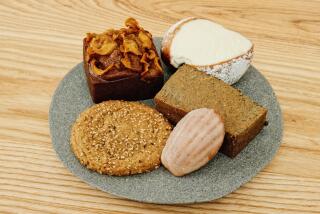Monks cook up ideas to put bread on table : From bonsai trees to Web pages, innovations are helping monasteries remain self-sufficient.
- Share via
CONYERS, Ga. — At Christian monasteries around the nation, monks are busy baking and shipping delicacies--fruitcakes, bourbon fudge, gourmet cookies, flavored honeys--filling the holiday gift orders.
The tasty items from abbey kitchens provide a portion of the annual income needed to sustain the monks in their spiritual life. St. Benedict, the father of Western monasticism, ruled in the 6th century that monks must be self-sufficient.
But in this modern age, raising the funds needed for upkeep requires many hands: There are fewer men entering the life of self-sacrifice; those within the cloistered walls are aging; and it takes young backs and agile fingers to work the farmland or make the bread that supports many a monastery.
Take, for example, the Monastery of the Holy Spirit in Conyers. For years their rich, brown, whole wheat bread was sold in stores throughout the Atlanta area. But due to the lack of “monk power,” as Brother Francis Michael calls it, today the bread is baked once a week and is available only in the monastery gift shop.
So the Holy Spirit monastery turned from bread to plants as a source of income. The late Father Paul Bourne brought bonsai to the abbey 30 years ago. A bonsai master, he trained other monks in the tedious work of developing the tiny trees. In the monastery’s greenhouses and outdoor sheds are thousands of bonsai in various stages of development.
Because the trees are too fragile for shipping, the monks have expanded their business to include the accessories needed by bonsai hobbyists. The monastery offers the largest North American selection of imported Chinese and Japanese containers, tools, books and other accouterments through its mail order catalogs.
“Bonsai for me is more than a business,” said Brother Francis Michael. “It’s an art. . . . Beauty, any expression of that, is an expression of God.”
At Mepkin Abbey in Moncks Corner, S.C., Father Francis Kline took a healthy egg trade and spun it into a second business. With 40,000 laying hens, there was an excess of chicken droppings. Kline solved manure-disposal woes by developing a product called “Earth Healer.”
The processed manure is packaged in cotton drawstring bags, which a gardener then steeps in a cup of hot water, adds cold water to dilute and the resulting liquid is poured over plants. Kline says Earth Healer, sold in garden shops in several states, provides nutrients to the soil and strengthens plants’ roots.
“Most of our communities have developed these cottage industries,” Kline said. “Our monasteries must be self-supporting because we don’t do any active ministry like preaching. The whole idea is to work for a living for ourselves.”
The brothers of Our Lady of Guadalupe Trappist Abbey in Lafayette, Ore., took advantage of their wine country location in seeking a new source of revenue. The abbey housed a cabinetmaking shop that closed about 20 years ago when the monks ceased making church furniture. The space was converted into a huge wine storage vault, and a second vault was built. With a capacity of up to 200,000 cases, the two vaults warehouse wine from about 60 vineyards in Oregon and Washington.
But the abbey’s oldest and most steady occupation is bookbinding. The Trappist brothers create 800 books a week, mostly bound volumes of medical and legal periodicals, as well as textbooks for colleges and universities.
The Monastery of Christ in the Desert in Abiquiu, N.M., may be the leader in abbey industrialism. Coupling their spiritual world with the cyberworld, two dozen Benedictine brothers design Web pages for the Internet. The monastery’s remote location requires the monks to work on solar-powered computers linked to cellular telephones.
The handsome Christ in the Desert Web page attracts clients from around the world. The biggest customer? The Vatican. More than 10,000 church documents are destined for the Web, and the brothers in Abiquiu hope to find foundations to underwrite the project.
At the Abbey of Our Lady of the Holy Trinity in Huntsville, Utah, Father David oversees a burgeoning mail-order business in flavored honeys--15 flavors to be exact--nuts, fruits and spices. He says he could expand the business if there were more monks to help. But because the monks are getting older and their numbers are dwindling, they’ve stopped baking bread and have given up their 8,000 chickens and their dairy cows.
Although Brother Francis Michael sees few young men entering the monastery these days, he is confident there will always be a monastic way of life. “People living apart, seeking a transcendence . . . it’s something in humankind that has been around for a long time. It has adapted along with the culture, and has taken from the culture a means to subsist.”






